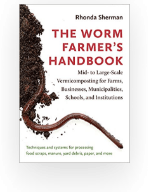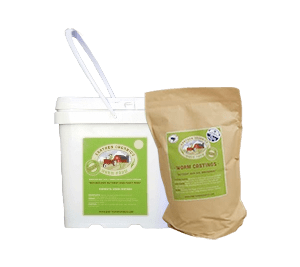Worm Castings for a Healthier Garden
Bringing life back to your soil
What are Worm Castings?
Worm castings (aka worm poop) are a natural soil amendment that you add to the soil when planting or brew into a tea to spray on plants. With small amounts mixed into the soil, plants grow larger and healthier – it’s nature’s own nutrient-rich plant food.
And for you science-y types…Here’s the actual definition: Worm castings are stabilized organic matter that are produced by the interaction of earthworms and microorganisms under controlled conditions.
Why worm castings?
The Difference is clear
These two tomato plants are a visual representation of why Earthen Organics worm castings are Mother Nature’s plant food. The plant on the left was planted in regular potting soil. The mixture for the plant on the right was 90% potting soil and 10% worm castings. They were planted on the same day, and 3.5 weeks later the difference is clear – the plant with 10% worm castings has a thicker stalk, bigger leaves, and already has blooms. Just a small amount of worm castings mixed into the potting soil produces larger, healthier plants.
We filter our worm castings using an 1/8” screen so that our customers receive a uniform, premium quality product. Our worm castings are made in Upstate South Carolina on our family’s land.
Won’t Burn Your Plants
Faster Growth And Development
Cost-Effective
As a fertilizer supplement, worm castings are the most cost-effective solution. A little bit really does go a long way.
Using a mix of 10-20% castings to blended soil will make a significant difference.
PROTECTS NATURALLY
Our Process
Our worm castings are made on our family’s land in beautiful Upstate South Carolina. It’s an entirely natural process, that begins by hot composting horse manure that we recycle from local stables. Hot composting kills pathogens and produces a very fine compost. We then add this compost to our worm bins.
We currently have a 48’ flow through bin. They’re called flow through bins because you add the composted manure and juice pulp to the top of the bin, the worms process it, and then the worm castings flow out the bottom of the bin when they’re ready.
Our bins contain red wiggler worms, which are great for composting. The process takes approximately 3 -6 months. Once we harvest the worm castings from the bins, we use a 12’ rotating trommel to screen the castings — first through a 1/8” screen, followed by an 1/4” screen. The finer the screen on the trommel, the more uniform our product is, giving you the best quality.
Featured:
 Earthen Organics has been featured in The Worm Farmer’s Handbook
Earthen Organics has been featured in The Worm Farmer’s Handbook